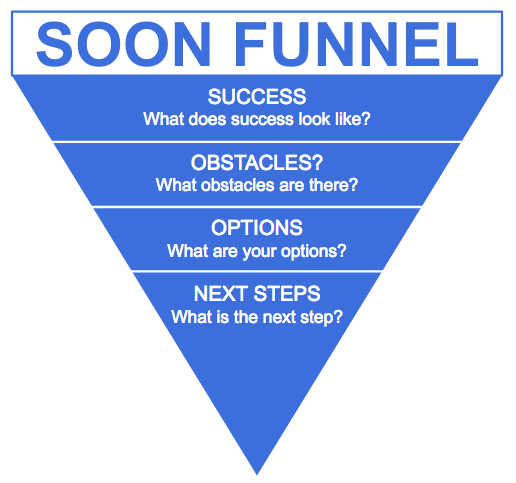
Great Managers Ask More Questions
As we work with schools and districts around the county to help them learn about and implement The NEW School Rules, one of the questions we’re often asked is “how do I become a better manager?” There are many theories of leadership and what it takes to be a great managers. I am particularly inspired by the work of LifeLabs Learning, who help managers develop a coaching mindset.
I was lucky to attend a small group workshop with Vaneeta Sandhu from LifeLabs Learning at the Culture Conference in April. The LifeLabs team partners with companies like Google, Whole Foods, Spotify, and Salesforce to develop more opportunities for growth and learning at work.
LifeLabs’ session was focused on “how to develop a coaching mindset.” I attended this workshop because it offered strategies for becoming a better listening and stronger manager, two competencies I think about frequently, both for myself and the leaders I coach.
Before this session, I knew that asking questions was important to being a good listener, manager, and mentor. However, I thought it was the quality of the questions that mattered most. In contrast, LifeLabs’ research has shown that it’s the quantity of questions can have a huge impact, regardless of the type of questions. Through field observations, LifeLabs found that the average quantity of questions in a fifteen minute conversation is two, but the average quantity of questions for great managers is ten.
As Nadia Goodman shares in Why the Best Managers Ask The Most Questions, “Thoughtful questions can move a meeting past a stuck point, uncover overlooked patterns, inspire innovation, and motivate employees. Plus, a team with a manager that asks more questions has higher work satisfaction and a greater sense of unity.”
 1. Counting my questions
1. Counting my questions
I had a 1-1 session with one of my advisees last week. During our conversation I actually tallied on paper how many questions I was asking, inspired by the LifeLabs’ session. It was hard to ask multiple questions before sharing ideas. My advisee was wrestling with a complex challenge and my instinct was to connect the dots for her and recommend the best path forward based on what I’ve seen work. Instead I tallied. Could I get to three questions before I made a statement? Yes. Could I ask a fourth question? Harder, but yes. Could I ask a fifth question before giving advice? At this point, I felt like I was really forcing the questions and defaulted to a technique that I learned from LifeLabs, which helps to bridge listening and responding: clarification. “I think I’m hearing you say that you need a clearer timeline from your project manager. Is that right?” Through this series of questions I realized, faster than I might have if I’d just given advice, that there were two separate, but related, tensions that my advisee was wrestling with. We got to a better set of next steps more quickly as a result of this up front clarification.
As LeeAnn Renninger, Director of LifeLabs, has articulated, “Instead of simply giving an answer, [great managers] help their direct reports clarify and deepen their own thinking. It quickly increases the performance of their team.” By forcing five questions before making a suggestion I was able to clarify for my advisee and me what the core need was; a different need than the one articulated at the start of our conversation.
2. Questions to start with

 3. Ask more questions
3. Ask more questions
I’m sharing the same advice that LifeLabs gave our workshop group. If you want to be a better listener, mentor, or manager, start by simply asking one more question than you usually would. It might help to track how many questions you are currently asking on a call, during a meeting, or in a mentoring session. I like to use a simple pen and post-it tally system. Then, the next time you meet with that person or group, see if you can ask one more question than before.
If you want to learn more about being a better listener and manager, check out LifeLabs’ experiments (I like this one on asking a scaling question). Let us know in the comments which one is your favorite. You can also join me in conversation at @kearaduggan.
This blog post was originally published on The KikiBrief.
About Keara Mascareñaz
Keara is a Managing Partner at Education Elements who focuses on how to build and scale a culture of innovation in large systems, how to create national communities of collaboration, and how to keep laughing when pursuing daunting, large-scale changes. She was lucky to collaborate with co-authors Alexis Gonzales-Black and Anthony Kim to design the website and toolkit for The NEW School Rules: 6 Practices for Responsive and Thriving Schools.





